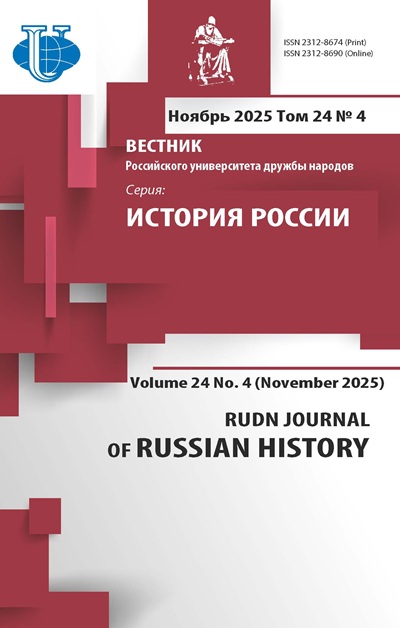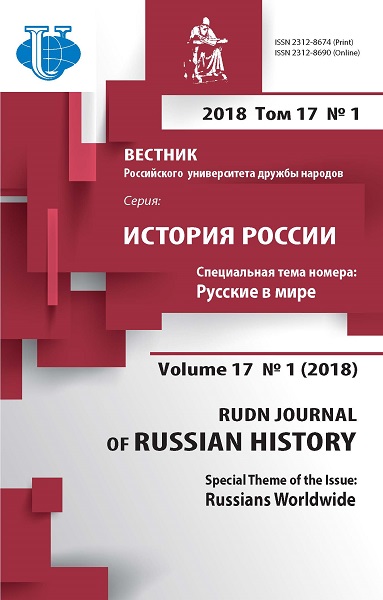Степан Востротин: сибирский взгляд из эмиграции
- Авторы: Кротова М.В.1
-
Учреждения:
- Санкт-Петербургский государственный экономический университет
- Выпуск: Том 17, № 1 (2018): РУССКИЕ В МИРЕ
- Страницы: 32-49
- Раздел: РУССКИЕ В МИРЕ
- URL: https://journals.rudn.ru/russian-history/article/view/18529
- DOI: https://doi.org/10.22363/2312-8674-2018-17-1-32-49
- ID: 18529
Цитировать
Полный текст
Аннотация
Настоящая статья посвящена малоизвестному эмигрантскому периоду жизни российского политического и общественного деятеля, бывшего депутата Государственной Думы от Енисейской губернии С.В. Востротина. В статье предпринята попытка через частную судьбу, используя антропологический подход, проанализировать возможности российских эмигрантов влиять на события в СССР в межвоенный период, выявить их отношение к советской политике, реконструировать представления о патриотизме. Статья основана на неопубликованных документах из ГАРФ, РГАСПИ, Бахметевского архива Колумбийского университета (США).
Ключевые слова
Об авторах
Мария Владимировна Кротова
Санкт-Петербургский государственный экономический университет
Автор, ответственный за переписку.
Email: mary_krot@mail.ru
доктор исторических наук (Санкт-Петербургский институт истории РАН, 2015), профессор кафедры международных отношений, мидиалогии, политологии и истории Санкт-Петербургского государственного экономического университета, член Ассоциации исследователей Русского зарубежья в Азиатско-Тихоокеанском регионе
Россия, 191023, Санкт-Петербург, улица Садовая, дом 21Список литературы
- Bakich O.Valerii Pereleshin: life of a silkworm. Toronto, Buffalo, London: University of Toronto Press, 2015. 391 p.
- Collection of S.V. Vostrotin. Box № 3. BAR
- Vostrotin S. Russia’s Crisis in the Far East. A Siberian View // The Slavonic and East European Review. London, 1935.Vol. 14. № 40. P. 105
- Vostrotin S.A Russian View of Manchuria // The Slavonic and East European Review. London, 1932.Vol. 11. № 31. P. 36
- Аблажей Н.Н. Сибирское областничество в эмиграции. Новосибирск: Изд-во Института археологии и этнографии СО РАН, 2003.
- Востротин С.В. Гибель русского дела в Маньчжурии [1935] // Collection of S.V.Vostrotin. Box № 1. BAR
- ГА РФ. Ф. Р-6091. Оп.1. Д. 146. Лл. 15-17
- ГА РФ. Ф. Р-6599. Оп. 1. Д. 8. Л. 50
- Государственный архив Российской Федерации (ГА РФ). Ф. 102. Оп. 92. Д. 313. Лл. 15 об, 19, 27, 28, 44, 56
- ДВП СССР. Т. 16. М.: Госполитиздат, 1970. С. 395-397
- ДВП СССР. Т. 18. М.: Госполитиздат, 1973. С. 178-179
- Документы внешней политики СССР (ДВП СССР). Т. 15. М.: РГГУ, 1969. С. 791
- Загребаева В.Н. «Вверх по Енисею»: из воспоминаний С.В. Востротина о путешествии с Ф Нансеном по Сибири в 1913 г. / публ. Загребаевой В.Н. // Исторический архив. М., 2012. № 3. С. 161-170
- Загребаева В.Н. «С Нансеном в Петербург». Из воспоминаний С. В. Востротина. 1913 г. / публ. Загребаевой В.Н. // Исторический архив. 2013. № 3. С. 137-148.
- Загребаева В.Н. «Человек с биографией». Жизнь и деятельность Степана Востротина: люди, события, факты [Электронный ресурс] / В.Н. Загребаева // сайт «Архивы Российской академии наук». М., 2014. URL: http://arran.ru/?q=publication&guid=CC67E8F63D2E-4452-A353-6D6FE899DA41.
- Загребаева В.Н. «Я приветствовал Нансена и других наших спутников». Воспоминания С. В. Востротина о морской экспедиции из Норвегии в устье Енисея в 1913 г. / публ. Загребаевой В.Н. // Исторический архив. 2008. №. 4. С. 104-146
- Кара-Мурза А.А. Степан Васильевич Востротин: «Сибирь - продукт вольного народного завоевания…» // Кара-Мурза А.А. Интеллектуальные портреты. Очерки о русских мыслителях XIX-XX вв. Вып. 2. М.: ИФ РАН, 2009. С. 143-154.
- Карташев А.В. Забвение трагедии // Россия и славянство (Париж). 1933. 1 июля. С. 4
- Нансен Ф. В страну будущего. Великий Северный путь из Европы в Сибирь через Карское море. Пг : Изд. К.И. Ксидо, 1915. С. 11-12.
- Протоколы заграничной группы конституционно-демократической партии: в 6 т. М.: РОССПЭН, 1999. Т. 6. Кн. 1. С. 32
- РГАСПИ. Ф. 558. Оп. 11. Д. 186. Л. 5
- РГИА. Ф. 323. Оп. 4. Д. 689. Л. 4.
- Российский государственный архив социально-политической истории (РГАСПИ). Ф. 558. Оп. 11. Д. 186. Лл. 1-16
- Российский государственный исторический архив (РГИА). Ф. 1268. Оп. 9. Д. 159. Л. 1.
- Русская военная эмиграция 20-40-х годов ХХ века. Документы и материалы. Т. 7. Восточная ветвь. 1920-1928 гг. М.: РГГУ, 2015. С. 806.
- Русский голос (Харбин). 1 января 1924. С. 1.
- Студенческая жизнь (Харбин). 1923. № 1. С. 37
- Харусь О.А. Парламентская тактика кадетов в III Государственной думе: опыт политической деятельности сибирских депутатов // Вестник Томского государственного университета. 2016. № 402. Январь. С. 155-163.
Дополнительные файлы















